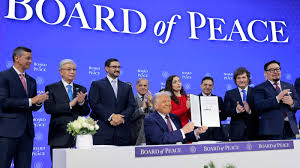1/ The Brookings #GlobalChina initiative is rolling out its latest round of research, this one on China’s efforts to adapt global governance to suit its aims. The following thread provides a brief summary of the research findings. brook.gs/2RfI5Gu
2/ Although China traditionally focused on the U.N.’s development activities, Beijing now flexes its muscles in the heart of the U.N. — its peace and security work. Reflections and analysis from Jeffrey Feltman via our #GlobalChina project: brook.gs/2GeFAC7 #UNGA75
3/ At times, Beijing has promoted women’s equality; at others, it has undermined civil society and human rights defenders, critical actors for advancing gender equality. @DariusLongarino explores the record: brook.gs/2Z27iIO #GlobalChina
4/ As China seeks to exert influence around the globe, Washington must invest in winning the competition of political systems, write @patrickwquirk, @DaveShullman, & @johannakao: brook.gs/3jxDVGa #GlobalChina
5/ The dangers of failing to revive climate cooperation between the U.S. and China are “unacceptably high,” writes @tsterndc via our latest #GlobalChina installment: brook.gs/3hVEZn3
6/ China is now the center of gravity for global energy markets. Will its demand continue to grow? How will China’s energy system respond to the challenges of climate change and local pollution? @samanthaenergy explains: brook.gs/3i3dveO #GlobalChina
7/ The trajectory of climate change depends on decisions about the infrastructure that Chinese entities fund abroad — decisions that result not from fiats in Beijing but from complex debates in China and beyond. New from @jeff_ball: brook.gs/2YGTuU6 #GlobalChina
8/ Much of Washington’s concern with China’s role in the global economy has to do with China’s only partial integration into global institutions, contends @davidrdollar via our #GlobalChina project. Learn what can be done: brook.gs/30WCquT
9/ Taking a page from America’s playbook, China is seeking to build a multilayered network of security institutions, partnerships, and cooperative activities that enhance its influence in Asia, writes @lindseywford: brook.gs/2DQj5me #GlobalChina
10/ Beijing is engaging more with international institutions. Is this a gain for the global human rights system? No, writes @SophieHRW in an analysis via our #GlobalChina project: brook.gs/3k5Lgx8
11/ @JimMillward & @dahlialpeterson outline heightened oppression in Xinjiang and what the U.S. and other actors can do to respond. brook.gs/2DZEbyL #GlobalChina
12/ While Beijing may dislike some aspects of U.N. peacekeeping, it appears to see greater strategic advantage in cooperating with the U.S. and other Western powers in this field, @RichardGowan1 argues. brook.gs/3mccXGr #GlobalChina
13/ China has emerged as a truly global actor, impacting every region and every major issue area. For an overview of the entire #GlobalChina project, check out: brook.gs/2l2vLNo
14/ Please tune in September 21 to join a great discussion on China’s approach to global governance and norms, featuring Jeffrey Feltman
@lindseywford
@SophieHRW
@DaveShullman
@patrickwquirk
brook.gs/3mfaURZ via @BrookingsInst
@lindseywford
@SophieHRW
@DaveShullman
@patrickwquirk
brook.gs/3mfaURZ via @BrookingsInst
15/ Special thanks to the entire @Brookings team for producing and delivering this diverse, deeply researched content, especially @AnnaBNewby, @tedreinert, @RachelASlattery, Emilie Kimball, @rushdoshi, and @chhabrat. End.
• • •
Missing some Tweet in this thread? You can try to
force a refresh





